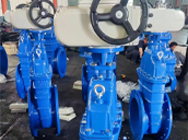Durable Forged Steel Pipe Fittings for Reliable Plumbing Solutions and Industrial Applications
Forged Steel Pipe Fittings An Overview
Forged steel pipe fittings are essential components in various piping systems, commonly employed in industries such as oil and gas, power generation, construction, and water treatment. They play a crucial role in ensuring the integrity and efficiency of fluid and gas transport systems. This article aims to provide a comprehensive overview of forged steel pipe fittings, including their manufacturing process, types, applications, and advantages.
Manufacturing Process
The production of forged steel pipe fittings begins with selecting high-quality steel. The most commonly used materials include carbon steel, alloy steel, and stainless steel, each chosen for specific properties such as strength, corrosion resistance, and temperature tolerance. The manufacturing process involves heating the steel to a plastic state and then shaping it under high pressure using a forging process. This method aligns the steel’s grain structure, resulting in stronger and more durable fittings compared to those produced through casting.
Once the fittings are forged, they undergo various machining processes to achieve precise dimensions and tolerances. These processes may include drilling, threading, and surface treatment, which can involve processes like galvanization or powder coating for enhanced resistance against corrosion and wear.
Types of Forged Steel Pipe Fittings
Forged steel pipe fittings come in several types, each designed for specific uses
. The most common types include1. Elbows Used to change the direction of the pipeline, available in various angles such as 90 and 45 degrees. 2. Tees Allow for branching off in a pipeline, connecting two pipes at a right angle. 3. Reducers Facilitate a change in pipe diameter, helping to join sections of different sizes. 4. Caps Used to seal the end of a pipe, preventing the flow of fluids and gases. 5. Flanges Provide a means to connect pipes, valves, and other equipment, allowing for easy maintenance and assembly.
Each fitting type serves a specific purpose in the overall piping system and is chosen based on the application’s requirements.
forged steel pipe fitting

Applications
Forged steel pipe fittings are widely used across various sectors. In the oil and gas industry, these fittings are crucial in high-pressure pipelines, where reliability and safety are paramount. They are also prevalent in power generation plants, where high temperatures and pressures demand robust materials. In construction, forged fittings are used for water supply lines, heating systems, and fire protection systems, ensuring the safe and efficient transport of liquids.
Moreover, in the chemical processing industry, where corrosive substances are transported, the corrosion-resistant properties of stainless steel forged fittings make them an ideal choice.
Advantages
The popularity of forged steel pipe fittings can be attributed to several advantages
1. Strength and Durability The forging process enhances the strength of the material, making these fittings capable of withstanding high pressures and temperatures. 2. Versatility They are available in various shapes and sizes, making them suitable for numerous applications and industries. 3. Corrosion Resistance Materials like stainless steel offer excellent resistance to corrosion, extending the lifespan of the fittings. 4. Cost-effective While forged fittings might have a higher initial cost, their reliability often leads to lower maintenance and replacement costs over time.
Conclusion
In summary, forged steel pipe fittings are vital components in modern industrial piping systems. Their strength, versatility, and ability to withstand challenging conditions make them indispensable in various applications. As industries continue to evolve, the demand for high-quality forged steel fittings will likely grow, underscoring the importance of innovation in manufacturing techniques and material science. Understanding the characteristics and benefits of forged steel pipe fittings is essential for engineers and professionals tasked with designing and maintaining safe and efficient piping systems.
-
The Versatility of Ball Valves in Fluid Control SystemsNewsJun.10,2025
-
The Practical Benefits of Centerline Butterfly ValvesNewsJun.10,2025
-
The Benefits of Bellows Seal Globe Valves for Industrial SystemsNewsJun.10,2025
-
The Advantages of Offset Butterfly ValvesNewsJun.10,2025
-
Ductile Gate Valves: Strong, Reliable, and Essential for Every SystemNewsJun.10,2025
-
Cast Iron Gate Valves: A Reliable Solution for Every SystemNewsJun.10,2025
-
Why Choose a Brass Gate Valve for Superior Performance and DurabilityNewsMay.09,2025




